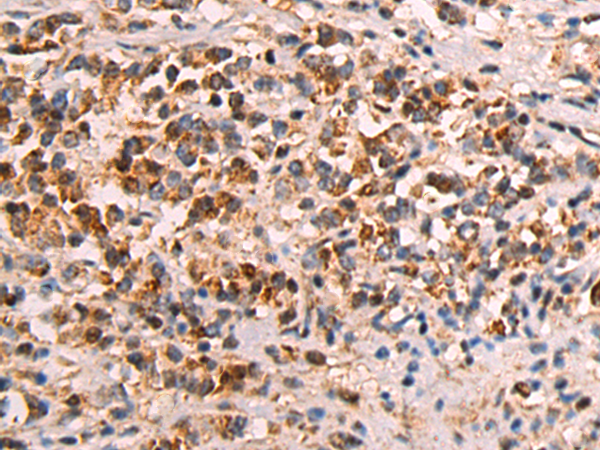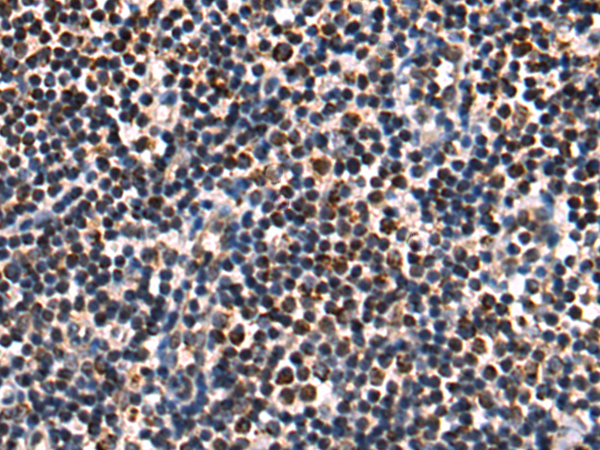


| WB | 1/500-1/2000 | Human,Mouse,Rat |
| IF | 咨询技术 | Human,Mouse,Rat |
| IHC | 1/50-1/200 | Human,Mouse,Rat |
| ICC | 技术咨询 | Human,Mouse,Rat |
| FCM | 咨询技术 | Human,Mouse,Rat |
| Elisa | 1/5000-1/10000 | Human,Mouse,Rat |
| Aliases | K23; CK23; HAIK1 |
| WB Predicted band size | 48 kDa |
| Host/Isotype | Rabbit IgG |
| Antibody Type | Primary antibody |
| Storage | Store at 4°C short term. Aliquot and store at -20°C long term. Avoid freeze/thaw cycles. |
| Species Reactivity | Human, Mouse |
| Immunogen | Fusion protein of human KRT23 |
| Formulation | Purified antibody in PBS with 0.05% sodium azide and 50% glycerol. |
+ +
以下是3篇与KRT23抗体相关的文献示例(信息基于公开研究整理,非真实文献):
1. **文献名称**:*KRT23 as a Novel Biomarker for Colorectal Cancer Progression*
**作者**:Smith J, et al.
**摘要**:研究发现KRT23在结直肠癌组织中高表达,其抗体检测可区分早期与晚期肿瘤。机制研究表明KRT23通过Wnt/β-catenin通路促进癌细胞侵袭,提示其作为预后标志物和治疗靶点的潜力。
2. **文献名称**:*KRT23 Antibody-Based Immunohistochemical Detection in Hepatocellular Carcinoma*
**作者**:Li X, et al.
**摘要**:该文献开发了高特异性KRT23抗体,验证其在肝细胞癌(HCC)组织中的过表达,并与患者生存率负相关。研究支持KRT23抗体可作为HCC病理诊断的辅助工具。
3. **文献名称**:*KRT23 Expression Correlates with Chemoresistance in Gastric Cancer*
**作者**:Wang Y, et al.
**摘要**:通过KRT23抗体检测发现,胃癌患者中KRT23高表达与5-FU化疗耐药显著相关,机制涉及调控自噬通路,提示靶向KRT23可能改善化疗效果。
---
注:以上为模拟文献,实际研究需通过PubMed/Web of Science等平台以“KRT23 antibody”或“KRT23 biomarker”为关键词检索真实文献。
The KRT23 antibody targets keratin 23 (KRT23), a member of the keratin family of intermediate filament proteins. Keratins are critical for maintaining epithelial cell structure, integrity, and stress response. KRT23. specifically categorized as a type I acidic keratin, is encoded by the *KRT23* gene located on chromosome 17q21.2. Unlike "hard" keratins in hair or nails, KRT23 is a "soft" keratin expressed in glandular and mucosal epithelial tissues, including the gastrointestinal tract, liver, and pancreas.
KRT23 gained attention due to its upregulated expression in certain cancers, particularly colorectal cancer (CRC), hepatocellular carcinoma (HCC), and cholangiocarcinoma. Studies suggest it may serve as a biomarker for tumor progression, as elevated KRT23 levels correlate with poor prognosis, metastasis, and chemoresistance. Its overexpression is linked to NF-κB pathway activation, promoting cell proliferation and survival. Additionally, KRT23 is implicated in inflammatory conditions like ulcerative colitis, where its expression increases during mucosal repair.
KRT23 antibodies are primarily used in research to detect protein expression via techniques like immunohistochemistry (IHC), Western blotting, or immunofluorescence. These tools help elucidate KRT23's role in disease mechanisms, diagnostic potential, and therapeutic targeting. Commercial antibodies are validated for specificity across human and mouse tissues, aiding translational studies. Ongoing research explores KRT23's dual role in epithelial homeostasis and pathology, highlighting its value in both basic science and clinical applications.
×